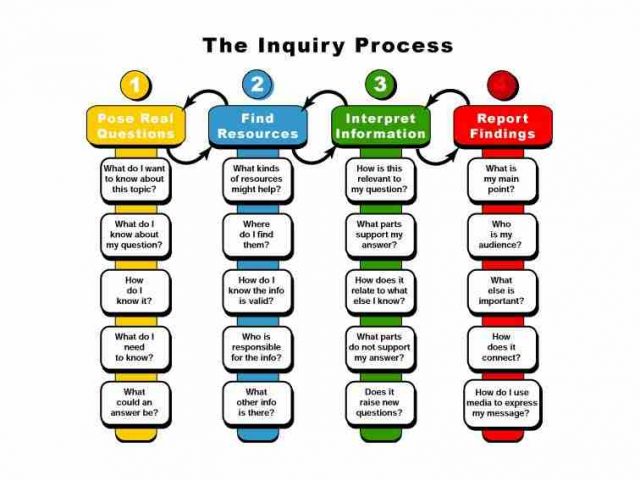MYP Inquiry Questions: Types and Examples

Talking about the Middle Years Programme (MYP) within the International Baccalaureate (IB), one of the essential components in the student’s learning process is MYP inquiry questions.
These questions serve as the backbone, guiding students toward a deeper comprehension of the unit’s statement of inquiry. To know the inquiry questions, explore the definition, purposes, types, examples, and other related information here.
First Things First, Know What Inquiry Questions Are
At its core, an inquiry question is a thoughtful query designed to stimulate investigation and exploration.
In the educational context, particularly in International Baccalaureate (IB) MYP, these questions serve as the foundation for structured inquiries that aid in unravelling the intricacies embedded in the unit’s statement of inquiry.
So, it can be stated that these questions act as a roadmap, steering students towards a deeper understanding of the unit’s statement of inquiry.
Also Read: International Baccalaureate Programme with Its Unquestionable Qualities
The Purpose of Inquiry Questions
The next question is, what is the purpose of inquiry questions? The main objective is to foster critical thinking and encourage students to engage actively with the concepts presented in their academic journey.
It provides essential support for students to enhance their understanding of the unit’s overarching statement of inquiry.
Teachers, especially in interdisciplinary units, collaborate to craft transferable questions, spanning factual, conceptual, and debatable domains.
Therefore, these questions, intertwined with the unit’s concepts and the global context exploration, offer diverse perspectives, encouraging students to delve into the intricate elements expressed in the statement.
Types of MYP Inquiry Questions
In the learning landscape, these questions come in various types, each serving a distinct purpose in fostering intellectual exploration and critical thinking. Here are the details:
-
Factual
At the foundational level, factual inquiry questions act as gateways to knowledge acquisition. These questions, often beginning with ‘What’ or ‘Which’, prompt students to recall and comprehend information.
Drawing inspiration from the statement of inquiry, these questions explore the meaning of concepts, context, and terminology.
-
Conceptual
Moving beyond mere recall, conceptual inquiry questions elevate the level of inquiry to analysis and application. Phrased with ‘How’ or ‘Why’, these questions encourage students to delve deeper into key concepts and their relationships.
Conceptual questions are crucial in prompting nuanced exploration and understanding of the unit’s subject matter.
-
Debatable
Debatable questions propel students into the realm of synthesis and evaluation. These questions, often starting with phrases like ‘To what extent’, ‘Should’, or ‘Could’, demand that students take a stance and engage in discussions.
These questions foster critical thinking, encouraging students to weigh multiple perspectives and articulate well-founded opinions.
Examples of Inquiry Questions for Each Type
Understanding the characteristics of each question type is vital. Factual questions focus on recall and comprehension, conceptual questions stimulate analysis and application, while debatable questions encourage synthesis and evaluation.
Now, let’s explore more examples of MYP inquiry questions for each type:
-
Factual Inquiry Questions
In the context of an interdisciplinary unit focusing on environmental issues and communication tools, examples could be:
- What are the prevalent environmental challenges that we encounter?
- Which forms of evidence can be identified in this context?
- Which communication tools and techniques are effective in conveying information clearly?
-
Conceptual Inquiry Questions
Moving beyond facts, conceptual questions prompt analysis and application, encouraging students to explore relationships between key concepts and delve into the deeper meaning of the subject. Taking the same interdisciplinary unit as an example:
- How do we go about obtaining, communicating, and referencing evidence?
- In what manner does evidence influence the persuasion of viewpoints?
- How do human decisions and actions contribute to the impact on the environment?
-
Debatable Inquiry Questions
Debatable questions are designed to stimulate discussions and debates, pushing students to take positions and justify them. Here’s one example:
- To what degree can communication-based on evidence influence environmental health, reducing negative human impacts and increasing positive ones?
- Should prioritising sustainability over profitability be a fundamental consideration in designing products for business?
- In the context of environmental issues, how much responsibility should individuals bear for the health of the environment, and what actions can be justified to achieve this?
Also Read: IB Diploma Programme: Benefits & The Subjects
Several Guides and Requirements of MYP Inquiry Questions
In the MYP, inquiry questions are meticulously curated, adhering to specific descriptors outlined by the International Baccalaureate organisation. They are evaluated based on three stages: “Beginning/developing,” “Using,” and “Sharing” inquiry questions.
As outlined by the IB publication on interdisciplinary unit plans, here are the detailed guides and requirements for each stage:
“Beginning/Developing” Inquiry Questions
At this stage, inquiry questions are in the early phases of development, here are the details:
- At this stage, questions may display a limited grasp of the differences between factual, conceptual, and debatable inquiries.
- There might be minimal connections between questions and the unit’s purpose, as outlined in the statement of inquiry.
- Lastly, the questions may lean towards a single approach to the unit’s subject matter, possibly being either too simplistic or overly complex for the intended learners.
“Using” Inquiry Questions
This stage signifies progress in the development of inquiry questions in higher level than the first one, including:
- In this phase, inquiry questions show progress by including examples of factual, conceptual, and debatable queries.
- These questions are more intricately connected to the concepts and global context specified in the statement of inquiry.
- Descriptions of multiple pathways into the unit’s subject matter exhibit a more comprehensive understanding.
- The questions exhibit an appropriate level of rigour, ensuring a meaningful learning experience.
“Sharing” Inquiry Questions
This stage represents a more advanced level of development in inquiry questions, characterised by:
- At the advanced stage of development, inquiry questions demonstrate a deep understanding of the relationship between facts, concepts, and debates.
- They contribute to interdisciplinary understanding, facilitating connections between various disciplines.
- Offering diverse pathways into the unit’s subject matter, these questions represent a complexity that fosters critical and creative thinking, supporting synthesis.
- Importantly, they prepare students for summative assessments, aligning with both teacher-generated and student-generated inquiries.
Details to Remember About MYP Inquiry Questions
In crafting inquiry questions, it’s crucial to remember various details. Here are several important details you should note:
- Make sure your inquiry questions come directly from and are inspired by what the unit is all about, capturing the main theme.
- Each question should link to at least one unit concept, ensuring a direct connection to the subject matter being explored.
- Inquiry questions should serve as guides, directing inquiries into the relationships between concepts and fostering a deeper understanding.
- To facilitate interdisciplinary learning, these questions should be explored by all participating subjects, promoting a collaborative approach.
- Inquiry questions should function as prompts during inquiry-based learning experiences, driving the learning process effectively.
For the best international education experience with the International Baccalaureate that incorporates MYP inquiry questions in the curriculum, explore BINUS SCHOOL Simprug High School Diploma Programme.
Frequently Asked Questions
Last but not least, let’s explore several frequently asked questions regarding the MYP inquiry questions:
What are the 5 guiding questions of inquiry?
There are five guiding questions of inquiry, including:
- What?
- So what?
- Now what?
- How?
- Why?
What are IB’s lines of inquiry?
A line of inquiry in the IB context is a set of questions pursued through reading and research. It offers a framework to explore a subject further, often starting with partial answers that students aim to develop through research.
How do you write a good inquiry question?
Writing a good inquiry question involves clarity, focus, and relevance. It should be clear, focused, and provide a path for achievable research. Additionally, using key terms connected to the topic, title, and the IB subject or world studies area is essential.
Reference:
https://guide.fariaedu.com/interdisciplinary-teaching-and-learning/inquiry/inquiry-questions
https://guide.fariaedu.com/pyp-unit-planning/overview/lines-of-inquiry
https://sites.google.com/natomasunified.org/ihsmypteacherresources/myp-unit-planning/inquiry-questions-lines-of-inquiry
https://www.mypmaths.com/post/statement-of-inquiry
https://oakham-rutland.libguides.com/ib-extended-essay/wonder#:~:text=Your%20line%20of%20inquiry%20will,and%20shapes%20your%20final%20essay.
https://www.splashlearn.com/blog/what-is-inquiry-based-learning-a-complete-overview/
https://english.washington.edu/sites/english/files/documents/ewp/lb1.doc#:~:text=A%20line%20of%20inquiry%20is,would%20like%20to%20pursue%20further.


